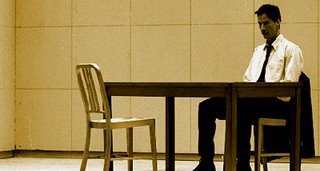
Note: This article was translated into Hindi and published in HARIBHOOMI (10.07.2006)
At the risk of subjecting their reportage to falsification,
Mr. Sunil Kumar,
Mr. Ramesh Nayyar et al have been more honest than they should have about their visit to Dornapal camp
: (1) the Chief Minister, no less, asked them to visit the camp-site and report about it; (2) consequently, they were, individually as well as collectively, taken there, in 'Maina', the state-helicopter christened ironically after that loquacious mimic of his/her-master's-voice: the Bastar Maina; and (3) their interaction with camp-inmates was supervised directly by the twin-heads of the local district administration. Clearly, the state government took more than the requisite precautions to ensure that these eminent journalists saw exactly what it wanted them to see: that tribals have taken refuge in state-run gulags to fight- or more likely, flee from- Maoist violence. Be that as it may, certain discrepancies continue to disturb me:
(1) History- indeed biology- speaks of evolution as punctuated. It takes a catastrophe of astronomical proportions to force an entire people out of homelands they have lived on for thousands of years. This would apply more to tribals, who- because of the peculiar symbiotic interdependence they have with their habitats- tend to think of land as 'Mother'. As things stand, there is no record- proof, report, statistic- of any such incident(s) which could have forced tribals into the illusory safety of makeshift camps. Infact, evidence paints a contrary picture: SJ has led to a geometric rise in tribal casualties; not vice-versa. If anything, the chances of tribals being abducted, blasted or shot-dead in villages was far less in the pre-SJ days. The fact of collaterality between the conception of SJ- as outlined in Mr Pisda's 'proposal for a people's movement against naxalites'- and the change of government at Raipur provides a much more plausible explanation for its 'spontaneous' emergence.
(2) No spontaneous movement has a prior blueprint. The Pisda-proposal, as mentioned above, preceded SJ. This document- and the date on it- is a dead giveaway. Infact, it has taken total state involvement- the wholesale committing of its resources at multiple levels- to sustain the so-called movement on a day-to-day basis. Also, unlike other 'spontaneous people's movements', SJ has failed to produce its leaders. A pre-existing leadership has been grafted over it, again with full state-backing. Without this continuous state-backing required now in increasing proportions, this leadership would be washed out in less than a day. One need only compare the SJ leader's election-result from his assembly segment during VS (November 2003) with that of LS (March 2004): in barely four months time, he went from a lead of about 5000 to a loss of over 17000.
(3) Further sustenance of SJ is based on its own three-fold logic, and has nothing to do with tribal-interests:
(a)
POLITICAL: Come election-time, and there will be no polling stations in evacuated villages. Instead they will be set-up well within the guarded perimeter of these 6-7 concentration camps. And it doesn't take a psephologist to predict the electoral outcome under such 'free, fair and impartial' conditions. Does it? Think about it. Had elections been 'conducted' in Auschwitz, wouldn't the National Socialists (Nazis) have swept the polls? Thankfully, unlike der Fuhrer- who didn't consider his refugees worthy of the vote- this regime views the tribals as- and only as- a Votebank. And SJ, as it happens, is the surest way to encash this votebank en block.
(b)
CULTURAL: Concentration of vast tribal populations in the controlled environment of camps provides an easy assembly-line for the Sangh troika and its affiliates to work overtime in order to factory-produce indoctrinated specimens: a people repeatedly told that they are worshipping 'false' gods, eating 'polluted' foods, following 'promiscous' practices and 'anachronistic' customs; and systematically made to feel ashamed about their (former) 'primitive and barbaric' way of life; thus slowly but surely falling in line with the (pseudo-)'hindutva' pogrom of the RSS. Much more than the geopolitical displacement, it is this sense of 'cultural displacement', which will come from living in camps, that worries me. Henceforth, camp-refugees will be permanently scarred by a false sense of 'inferiority-complex', and adapted to a type of doggish existence where they will be always told what to do and feel and think. Free-will has been the greatest casualty.
(c)
ECONOMIC: As with all tribal-targetted government schemes, SJ camps have given birth to their own peculiar industry. Tens of millions of rupees spent daily by the state-exchequer to provide housing, food, health-care and schooling to the over 70,000 tribals is being siphoned off by a clique of middlemen and their bureaucratic and political patrons. Put simply, it is not in their interest to wind-up such an enormously lucrative & profitable business.
(4) The fourth problem with SJ is that it puts LWE squarely within the bracket of a 'law & order' problem. Its socio-economic component is not so much washed-away as it is wished-away. A rather convenient way for the state to get rid of its guilt in having fostered the problem in the first place: it was, after all, due to abject apathy on the part of the welfare-state that Maoists found such eager receptacles among tribals for their cause to overthrow that very state. Be that as it may, the fact is that the 'law and order' component deals merely with LWE's symptom; the cause- which is necessarily socio-economic- is totally overlooked. What is needed, therefore, to overcome the LWE challenge is not more guns, more helicopters, more bombs, more forces and more bullets but instead more roads, more schools, more electricity, more irrigation, more primacy health care centers, more industry and more internet. Provide the latter and by God, there wouldn't be much use for the former. To enable this, we need to replace double-quick the two environment legislations of 1980 with the Tribal Act (now pending before Parliament), thereby making tribals masters of their homelands once again, and guaranteeing- again by means of a separate legislation, if need be- that a minimum proportion of tribals find gainful employment in each of the sectors in all industries/businesses that have been- and will be- set-up in this region.
(5) Any 'final solution' has to be political. Comrade Prachanda has shown the way in Nepal; and it would be best if his Indian counterparts in Vizag follow suit. India can not- and will not- compromise on what Pandit Nehru described as the first of the 'non-negotiables': the territorial integrity and political sovereignty of the nation. So, the CRZ- 'red corridor' or whatever it is called- has got to be totally ruled out. What should instead be put on the cards is incorporating- through constitutional means- the Maoists in what Khilnani has described as Humanity's third and greatest experiment ever: the colorful pagaentry of Indian Democracy. To accomplish this, governments will have to bring a lot more to the table.
(6) One more thing before I part, living in far-off urban centres, it is only too easy to view tribal casualties as an unfortunate statistic. Every so often, the human 'angle' of the unfolding tragedy is forgotten. That needs to change. SJ is a movement run from Delhi and Raipur; the people of Bastar have had very little to do with it. To put a stop to this madness, it is necessary for the people of these cities- especially those who are in a position to take decisions- to be sensitized about this aspect.
(7) Popular media has a choice: either it can be reduced to Noam Chomsky's 'bludgeon of democracy', seeing and saying what the state wants it to see and speak about (something this state government has ensured through the Chhattisgarh Public Safety Special Act); or it can give voice to a people who have been silenced long before the bullets and the bombs ever will be.
AJ
Read More (आगे और पढ़ें)......



